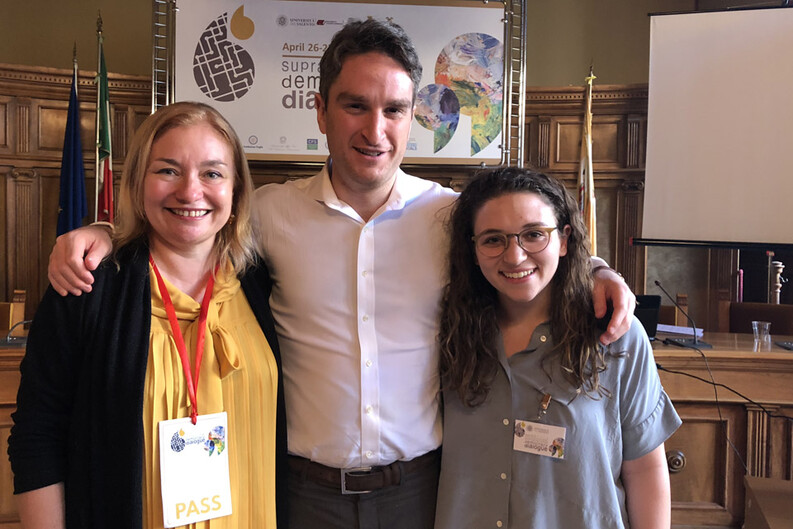Student Presents at inaugural Supranational Democracy Dialogue Conference

In April 2018, Gabriella Capone (JD/MBA ’19) presented at the inaugural Supranational Democracy Dialogue, a two-day convening of global academics, practitioners, and activists promoting democratic participation above the level of the nation-state. The University of Salento hosted the conference, which was organized by Professor Susanna Cafaro.
Increasing the democratic nature of multilateral institutions can improve accountability, reduce corruption, and increase inclusiveness, Capone explained. The convening centered on theoretical and practical approaches to supranational democracy, as well as issues that would particularly benefit from transnational approaches, including environment regulation, immigration, and transnational migration. In the wake of Brexit, the conference also addressed the state of federalism, transnationalism, and citizen participation in the European Union.
Capone presented alongside Daniel Goldman (MBA ’09) in a roundtable New Paths for Global Interaction. Their talk, “Data-driven Distributed Governance: an Ecosystems Approach,” brings systems thinking to the design and governance of economic and political systems. This approach accounts for all the constituents and relationships within a system because each constituent of an ecosystem is important, and relationships between members can have far-reaching implications for the system as a whole.
In practice, such an approach prioritizes data collection and analysis that includes all economic agents, rather than focusing narrowly on specific industries or types of individuals in a siloed fashion. To apply that holistic approach to economic policy-making, Goldman and Capone synthesized innovations in data organization and public crowdsourcing that can enable international institutions to better collect, use, and open-up economic data. Their model for global economic governance prioritizes using new information systems that make trans-national, trans-industrial data sharing possible.
New data collection paradigms and modes of citizen participation
“Crowdsourced, distributed designs for data collection can create an accurate, anonymized, and invaluable pool of data relevant to all members of an economic community—all generated by and accessible to individuals on-the-ground,” said Capone. “This ecosystems approach to economics and governance aligns with a democratic vision of sustainable economic development.”
The rise of distributed systems has significant implications for global monetary, financial, and economic institutions, the presentation explained—from the proliferation of mobile phones, to the rise of cloud-based, blockchain, and mobile-based systems for collecting and sharing data. Telemedicine involves the remote provision of life-saving medical services and routine care. Kepler, a Rwandan flipped classroom university, assigns as homework best-in-class MOOC content to drive high-level in-class seminars. Usahidi uses citizen crisis reporting and aggregation for increased service-delivery across regulatory agencies. Locus Analytics, where Capone worked as a Project Manager and Goldman was a founding member, provides a code-based framework for inputting and analyzing data across language, scale, industry, and context. Estonia has implemented a digital government which exclusively interacts with citizens online and redefines the notion of national borders with its e-citizenship model. New and existing multilaterals can harness such distributed tools, and amplify analysis through techniques like machine learning, artificial intelligence, and network analytics.
Beyond new data-sharing paradigms, public crowdsourcing can enable a participatory, grassroots approach to economic data sharing and governance, Capone said. For example, the use of citizen participation and enabling technologies in the lawmaking process (CrowdLaw) actualizes such an approach. The Region of Tuscany and City of Bologna institutionalized the right to public participation in local governance and created accordant engagement processes to promote that right. Colombia’s Mi Senado is a mobile app through which citizens can track the Senate’s plenary sessions, check attendance to promote accountability, and submit votes on items on the floor in real-time. Such participatory initiatives can help bring to life the principles of deliberative democracy, which prioritizes the use of dialogue, mutual understanding, and consensus in decision-making. Citizens Assemblies in Ireland brought the public into the policy-making process via deliberation, and Iceland used crowdsourcing and deliberation in its constitutional redrafting process. (Professor Eiríkur Bergmann, who served on Iceland’s Constitutional Assembly and Council, discussed how deliberative methods could democratize and improve EU governance).
“Distributed governance at the supranational level will provide new methods for political inclusion, participation, and empowerment, creating a crucial long-term mechanism to counteract the rise in nationalism, isolationism, protectionism, polarization, and populism at the country level,” said Goldman. “The extraordinary promise of data-driven distributed technology to accelerate development in low-income countries will be realized through the application of these systems to address large-scale considerations of political, financial, and economic equity.”
Governance innovation and technology at Yale
The work builds on the Law School’s Spring 2018 Governance Innovation Clinic, run by Professor Beth Noveck. Through the Clinic, Capone worked with Aprille Knox (MA ’17) to design a workshop on citizen participation for the premier gathering of legislators from across the Western Hemisphere.
Across the University numerous efforts are promoting both governance and legislative innovation. The Information Society Project provides fora for governance innovation at the Law School. CrowdLawYale tracks innovations in lawmaking around the world. Empirically-oriented courses at the Law School, such as Mathematical Models of Law and Society, provide students with models and tools to analyze legal, legislative, and regulatory phenomena. Data-Driven Yale at the School of Forestry & Environmental Studies is using data to improve environmental policy-making and regulation.
Daniel Goldman is a senior advisor at Syntax LLC, an algorithmic asset management firm. He is a member of the International Institute for Strategic Studies and serves on the Bretton Woods Committee.


